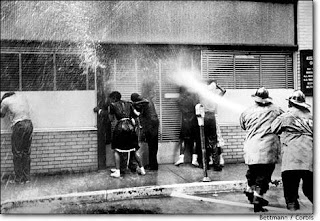The movement began in 1848 at Seneca Falls, NY where women gathered to make a list of grievances "We hold these truths to be self-evident: that all men and women are created equal; that they are endowed by their Creator with certain inalienable rights; that among these are life, liberty, and the pursuit of happiness" (1).
In 1869, famous female leaders Susan B. Anthony and Elizabeth Cady Stanton launched the National Women's Suffrage Assoiciation (NWSA) right around the time that Wyoming granted women suffrage. In addition, Colorado is the first state to adopt an amendment granting women the right to vote (in 1893). Utah and Idaho follow suit in 1896, Washington State in 1910, California in 1911, Oregon, Kansas, and Arizona in 1912, Alaska and Illinois in 1913, Montana and Nevada in 1914, New York in 1917; Michigan, South Dakota, and Oklahoma in 1918 (2). Black women also formed a group called the National Association of Colored Women (NACW) who also had the same goals as the NWSA - universal suffrage.
The National Women's Party, led by Alice Paul and Lucy Burns, began a strong push for the passage of the Anthony Amendment. That push includes protesting in front of the White House and other acts of civil disobedience. check out the trailer for HBO's Iron Jawed Angels:
That's Hilary Swank (2 time Oscar winner) playing Alice Paul. Paul and Burns decided to take their pursuit of suffrage to a whole new level which scandalized old-fashioned suffragists like Carrie Chapman Catt, but in the end, proved more effective than not. For instance, Paul and Burns organized a march for President Wilson's inauguration in 1913 (and violence broke out afterwards).

 Lawyer Inez Milholland riding a horse in the 1913 parade (looking like Joan of Arc).
Lawyer Inez Milholland riding a horse in the 1913 parade (looking like Joan of Arc).Why We Don't Want Men to Vote (by writer Alice Miller, 1915):
- Because man's place is in the army.
- Because no really manly man wants to settle any question otherwise than by fighting about it.
- Because if men should adopt peaceable methods women will no
longer look up to them.
- Because men will lose their charm if they step out of their natural sphere and interest themselves in other matters than feats of arms, uniforms, and drums.
- Because men are too emotional to vote. Their conduct at baseball games and political conventions shows this, while their innate tendency to appeal to force renders them unfit for government (3).

"Illinois, Wisconsin and Michigan were the first states to pass the law; Georgia
and Alabama rushed to pass rejections. The anti-suffrage forces, which included
both men and women, were well-organized, and passage of the amendment was not easy.
When thirty-five of the necessary thirty-six states had ratified the amendment, the
battle came to Nashville, Tennessee. Anti-suffrage and pro-suffrage forces from
around the nation descended on the town. And on August 18, 1920, the final vote
was scheduled.
One young legislator, 24 year old Harry Burn, had voted with the anti-suffrage forces to that time. But his mother had urged that he vote for the amendment and for suffrage. When he saw that the vote was very close, and with his anti-suffrage vote would be tied 48 to 48, he decided to vote as his mother had urged him: for the right of women to vote. And so on August 18, 1920, Tennessee became the 36th and deciding state to ratify" (3).
2. Can you think of current or recent incidents / marches / protests where protestors had used more radical tactics to gain attention to their cause? Which ones? What did they do?
Due Friday, November 6. 150 words minimum.
Sources:
1. http://www.infoplease.com/ipa/A0875901.html The Declaration of Sentiments, Seneca Falls, NY, 1848.
2. http://www.infoplease.com/spot/womenstimeline1.html Women's Rights Timeline.
3. http://womenshistory.about.com/od/suffrage1900/a/august_26_wed.htm Women's History









